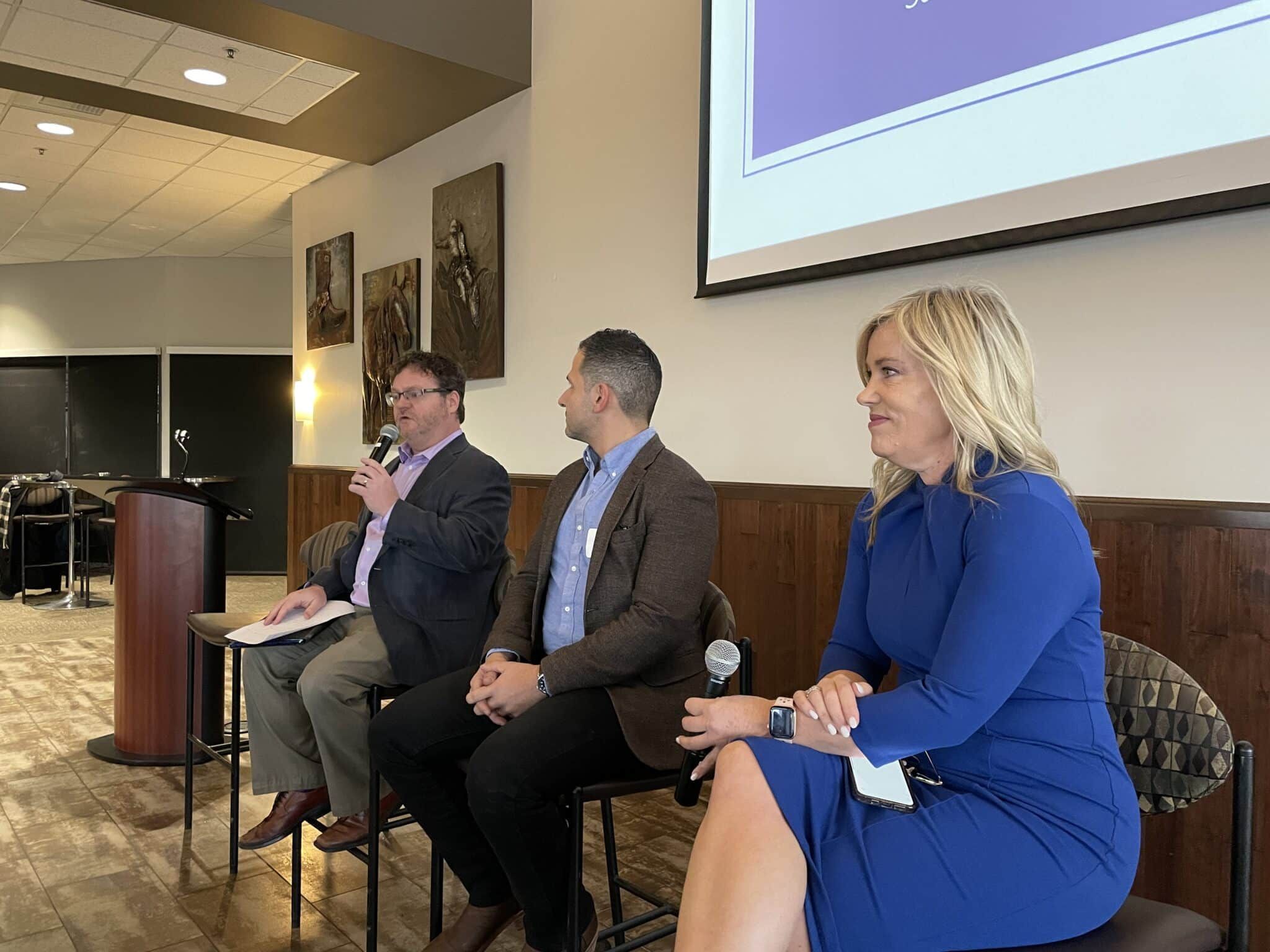Capitol dynamics will challenge business interests at Legislature

LOVELAND — The issues are the same: water, transportation, workforce. Yet the dynamics of getting things done in the Colorado Legislature may be substantially different from past sessions.
Members of the Northern Colorado Legislative Alliance on Wednesday discussed top-of-mind issues for businesses in the region as well as the challenges that will be faced in dealing with a legislative chamber that is overwhelmingly controlled by the Democratic Party.

The discussions occurred at the Regional Issues Summit at the Budweiser Events Center in Loveland. The event was presented by the NCLA, a lobbying group of the Fort Collins, Greeley and Loveland chambers of commerce, as well as Upstate Colorado Economic Development.
SPONSORED CONTENT
Empowering communities
Rocky Mountain Health Plans (RMHP), part of the UnitedHealthcare family, has pledged its commitment to uplift these communities through substantial investments in organizations addressing the distinct needs of our communities.
“Business likes some sort of balance at the Capitol,” said Ed Sealover, legislative reporter for the Denver Business Journal. He then added the big “however.”
“Balance is not going to happen. This is going to be a year of overwhelming margins. The margins are the largest that either party has had this century,” he said.
Democrats, who expected to lose seats in the state Senate in the November election, actually gained. The margins are so high — 46 Democrats to 19 Republicans in the House and 23 Democrats to 12 Republicans in the Senate — that committee membership will be dominated 9-4 in the House and either 5-2 or 6-3 in the Senate, Sealover said.
“This is a problem, particularly for Republicans who will have a much diminished voice. But it’s also a problem for the majority party,” he said, because it needs to keep its caucus in line.
Shad Murib, a long-time Democratic strategist and owner of Ulysses Strategies, said the diversity in the Democratic caucus will be difficult to control but a factor to consider is that balance may have been redefined in the time between the Jan. 6 U.S. Capitol riots and November 2022 elections.
“The definition of balance [may have changed] given what candidates ran against. Jan. 6 changed how people thought about government in their lives,” he said.
He also said that public opinion toward unions and workers is changing.
“People don’t like government in their lives, and the best ally for the business community is playing to the art of the possible … and finding a way to get to ‘yes.’”
“Keep in mind that the governor is a proud capitalist. He’ll be watching the fiscal notes on bills. You’ll see a lot of frustrated Democrats who can’t get their version [of a bill] past the governor.”
Sandra Solin, lobbyist for the Northern Colorado Legislative Alliance, said she expects the next session to be one of the most difficult she’s faced. “It’s incumbent upon us to tell our story,” she said. “We have to operate within the frame of what the [Democratic] caucus considers moderate, not necessarily what our organization considers moderate.”
Murib said most members of the Legislature “tie their identity to their district, not the party. Do the work; find the people who can tell their story.”
He advised businesses to pay attention to legislators who work across the aisle with members of the other party; they may be more open to hearing other viewpoints.
Solin said the coalitions that have been forged in Northern Colorado on issues such as transportation have power when attempting to influence legislators.
Solin said her greatest concerns have to do with state control of issues traditionally controlled at the local level. Said the statewide affordable housing issue and statewide water concerns may drive legislation that imposes control over land-use decisions that local governments have managed in the past.
Workforce
Mike Bell, an attorney with Ogletree Deakins that represents employers in the state, said that Colorado has become one of the most employee-friendly states in the country.
Paid sick leave, the “COVID supplement,” and the new family medical leave known as FAMLI could mean that “a typical employee could have 4½ to five months of paid leave available,” Bell said.
He said laws governing non-compete clauses in contracts have “essentially gutted” that protection for employers seeking to protect trade secrets.
And pay transparency, which requires employers to advertise pay ranges for positions regardless of where the job is located, has made it difficult for hiring companies, especially those with large operations outside the state.
Phil Hayes, a lobbyist for the Pipefitters Union and who also represents employers in the state, said he’s most concerned about the availability of people willing and able to work in the construction trades. He encouraged businesses to engage companies that have training components to their hiring practices. Apprenticeship programs are most effective in growing numbers of workers in the trades, he said.
He said he’s also concerned with the loss of “six figure salaries” in coal-fired electrical generating plants and replacing those jobs with $45,000 jobs erecting solar and wind farms.
He said he expects the Legislature to continue down the path of requiring buildings to be more efficient. “Expect heating and water to be at least 80% electric by a date certain,” he said.
Bell said “one of the most dangerous” bills likely to be presented in the upcoming session has to do with redefining the harassment standard that is used across the country.
“We have a standard that is essentially used coast to coast,” he said, noting that the standard requires a determination that an action in the workplace is “severe or pervasive.” Because the standard is applied across the country, most cases are filed in federal courts, where resources exist to handle such situations.
If the standard is changed in Colorado to “anything that is offensive to a reasonable person, it will place a massive burden on HR folks and those investigating claims.” Cases would move from federal to state courts, where there are fewer resources, Bell said.
Transportation
Ann Hutchison, president and CEO of the Fort Collins Area Chamber of Commerce, said in introducing a panel discussion on transportation that the state Department of Transportation had announced that Interstate 25 improvements had been funded.
Panelists, however, said that while expansion from Colorado Highway 66 at Longmont to Colorado Highway 56 at Berthoud are in the 10-year plan, delays may create shortfalls in the funding.
Herman Stockinger, deputy director of CDOT, said segments seven and eight, which are at Fort Collins and Loveland, will be done at the end of 2023 or early 2024. Segment six south of Loveland will be constructed through 2024. Segment five, however, between Berthoud and Longmont is in the plan but still subject to potential environmental redesign or delays from the transportation commission.
Stockinger said segment five will be funded partially with state and federal funds and partially through toll revenues. He said the transportation commission is considering today what the next steps will be for that segment.
State Sen. Barbara Kirkmeyer said she expects delays. “Until we get it done from state Highway 1 at Wellington to U.S. 36, it isn’t done,” she said. She said segment five has been designed and bid out but the commission may require more design work, which will delay the project.
She said even though segment five was in the works prior to the passage of Senate Bill 260, which placed more restrictions on highway construction, the makeup of the transportation commission has changed, which could mean delay.
Water
Members of a panel discussing water issues said that Northern Coloradans can expect to see changes as the population continues to grow and water resources become more scarce.
Jerry Gibbens, director of operations for the Northern Water Conservancy District, said that the district recently committed to a 30% reduction in nonfunctional turf as development continues in the region. The commitment resulted from continued debate over the future of the Colorado River Compact, which divides water resources equally between the upper basin states of Colorado, Utah, New Mexico and Wyoming and the lower basin states of California, Arizona and Nevada. The lower basin has been using more than its share of the river, and taking back those resources once allocated can be difficult.
“We need to think about development a little differently than we have in the past. We’re seeing less open space in our developments with 100% turf. We’re seeing landscaping that uses less water. Will there be other reductions? That’s possible,” Gibbens said.
Erik Dial, deputy director of utility, finance and customer service for the city of Greeley, said Greeley has changed how it charges developers for water because usage of water has changed.
Greeley determined that it was overcharging for water taps. For example, even though a restaurant and an office building might have one-inch taps, the usages are different and are now charged differently, he said.
LOVELAND — The issues are the same: water, transportation, workforce. Yet the dynamics of getting things done in the Colorado Legislature may be substantially different from past sessions.
Members of the Northern Colorado Legislative Alliance on Wednesday discussed top-of-mind issues for businesses in the region as well as the challenges that will be faced in dealing with a legislative chamber that is overwhelmingly controlled by the Democratic Party.

The discussions occurred at the Regional Issues Summit at the Budweiser Events Center in Loveland. The event was presented by the NCLA,…
THIS ARTICLE IS FOR SUBSCRIBERS ONLY
Continue reading for less than $3 per week!
Get a month of award-winning local business news, trends and insights
Access award-winning content today!


